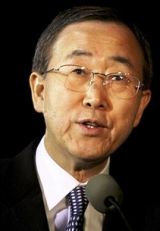UN, African Union launch frantic round of Darfur diplomacy
April 16, 2007 (UNITED NATIONS) — The United Nations and the African Union launched two days of frantic Darfur diplomacy here Monday as Khartoum approved the second phase of a plan for joint peacekeeping in the strife-torn Sudanese region.

Also attending the closed-door meeting were UN special envoy for Darfur Jan Eliasson and his AU counterpart Selim Ahmad Selim, who are tasked with reviving and broadening a wobbly peace deal reached between Khartoum and Darfur rebels last May.
Only only one of the three negotiating rebel factions endorsed last year’s Darfur peace agreement, which has remained a dead letter and failed to quell the violence which erupted in February 2003.
Monday’s consultations were focusing on the third and final phase of the plan floated last year by former UN chief Kofi Annan for a “hybrid” force of about 20,000 AU and UN troops.
The under-equipped AU force has failed to stem four years of ethnic strife that have resulted in at least 200,000 deaths and displaced more than two million people, according to UN figures.
Later Monday, Ban and Konare were to brief the 15-member Security Council on their deliberations as the United States and Britain put on hold plans to push for UN sanctions against Khartoum if it continues to block a sizable UN presence in Darfur.
The talks come amid growing and coordinated world pressure on Sudan to accept the joint AU-UN peacekeeping operation amid fears of an even bigger humanitarian crisis in Darfur as the mandate of the AU force on the ground expires on June 30.
The intensified pressure appears to bear fruit as Sudanese Foreign minister Lam Akol announced Monday that “Sudan has accepted the second phase of the agreement of UN support for the African force.”
Khartoum’s green light came after Ban last week reassured Sudan that helicopter gunships to be used by UN peacekeepers in Darfur would be for deterrence, not for offensive purposes.
In a letter sent to Ban and the Security Council presidency Monday, Sudan’s UN envoy Abdalmahmood Abdalhaleem confirmed his government’s consent for “the helicopters component”, which was the only remaining sticking point in a tripartite — AU, UN, Sudan — deal reached in Addis Ababa last Monday on the second phase of the UN Darfur plan.
The UN chief described Khartoum’s announcement as “a good sign”.
But wrapping up a five-day visit to Sudan, US Deputy Secretary of State John Negroponte warned Khartoum it faces isolation unless it accepts the “hybrid” force in Darfur.
“We must move quickly to a larger, hybrid United Nations-African Union peacekeeping force with a single, unified chain of command that conforms to UN standards and practices,” Negroponte told reporters.
The US official was one of several foreign dignitaries that have trekked to Khartoum to break the stalemate over Darfur.
Other visitors last week included South African President Thabo Mbeki and Libya’s number-two diplomat, Abdel Salem Triki who shuttled between Chad and Sudan after the two countries became embroiled in border clashes.
Friday, Libya also announced it would host an international conference on Darfur on April 28, with representatives of the United States, Britain, Sudan, Chad, Eritrea, the AU and the European Union expected to attend.
(AFP)
